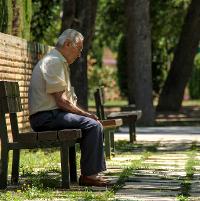As we look back on the arrival of the COVID-19 pandemic in Europe in 2020, we can reflect more objectively on the wider consequences. One of these was undoubtedly an increase in general levels of stress amoung our populations. The experience of stress is unique to each individual and the capacity to deal with stress is equally as unique. For older adults living with multiple chronic conditions, known as “multimorbidity”, these physiological stressors are associated with low quality of life, social isolation, and loneliness. In addition to the personal burden experienced by those living with multimorbidity, their caregivers may also experience higher rates of poor mental health. For older adults, stress and stress-related inflammation can affect the body in numerous ways. Acute stress, for example, can lead to impaired neuroendocrine function, which can in turn lead to hypertension and suppression of anabolic processes, or hippocampal atrophy. Additionally, chronic stress can lead to inflammation and is implicated in many later-life issues including insomnia, late-life depression, anxiety, cognitive decline and Alzheimer’s disease.
There is increasing evidence that older adults can use a variety of small incremental changes in their lifestyle to reduce their perceived levels of stress. Physical activity for example, has been found to be an evidence-based means of combating stress among older adults to reduce stress. Studies have demonstrated that those who are physically active experience fewer issues in regard to their mental health, specifically depression and anxiety disorders. Engagement in physical activity may exert a protective influence over stress inducing events and future mental health outcomes. An important aspect of physical activity as a stress reduction method is that drastic changes to one’s lifestyle do not need to be made and that increasing one’s activity from nothing to something is a start. In a randomized control trials examining the impact of physical activity interventions on older adults’ perceived stress, trials that involved low-intensity exercise and those that used a combination of strategies demonstrated the strongest evidence for stress reduction. Specifically, meditative movement forms of PA, such as Tai Chi and Qigong were identified as an effective strategy as was the combination of aerobic and anaerobic exercise or aerobic and nutrition/diet education.
The capacity to monitor one’s level of stress can be advantageous for a host of reasons. Used as an early-warning system, individuals may be able to identify precipitating events that have caused an increase in levels of stress. Using this technique, it may be possible to avoid certain stimuli that caused the event in the future, or at least provide fair warning to prepare for a stressful situation and to invoke stress-reducing resources, for example mindfulness. It may also be possible to identify whether a particular stress-reducing strategy has been effective, by monitoring levels of stress before and after an intervention.
Historically, total cortisol has been measured via serum; however, this has been prone to inaccuracy as the process of drawing blood itself may produce a stress response. Consequently, the procedure used to measure stress may elevate stress levels above what they likely would’ve been in absence of the procedure. As a result, alternative methods and less invasive methods of cortisol measurement have been sought. There is an increasing body of evidence that suggests that cortisol may be measured effectively using salivary or hair tests. Saliva provides the benefit of being unobtrusive for the patient and easy to collect and hair can present stress levels over time. By using non-invasive methods for the measurement of cortisol this may increase the uptake and adherence to cortisol measurement strategies. Interest in stress expands across research and industry realms, with increasing attention focused on the development of more accurate easily-administered mechanisms for the quantification and reduction of stress, outside of the lab and in the home. To this end, simple salivary swabs and brief digital assessments that individuals can administer themselves at their own convenience have been developed, for example by the Harper Institute. Using this simple and effective method, greater insights can be gained into how individuals are impacted by stress, how stress can be managed, and what sorts of strategies can be invoked to better offset the negative impact of these stressors.
Stress is experienced throughout the life course, from birth to old age. In the face of this inevitability, resources that enable the avoidance of the potentially deleterious aspects of stress are invaluable. Monitoring stress, through cortisol measurement for example, may provide insights into how an older adult or a caregiver responds to a given stressor, which can then be used to inform stress management or mitigation strategies. By adopting these strategies for dealing with stress it is hoped that greater mental health and wellbeing can be fostered at the individual and population level for older adults, their families, and their caregivers. The pandemic may be two years old, the pandemic may still have waves to come, but the past two years has also enabled scientists, the medical and health care professions, older adults and their families to expand their knowledge and practice around daily stress.
About the Author
Theodore D Cosco joined the Oxford Institute of Population Ageing in 2016 as a Research Fellow. Dr. Cosco is a Chartered Psychologist (British Psychological Society) trained in applied social research methods (MSc 2011, Trinity College Dublin) and epidemiology (PhD 2015, University of Cambridge), and Assistant Professor of Mental Health and Aging in the Department of Gerontology, Simon Fraser University. His research interests include resilience, mental health, and the interface between technology and healthy ageing.
Opinions of the blogger is their own and not endorsed by the Institute
Comments Welcome: We welcome your comments on this or any of the Institute's blog posts. Please feel free to email comments to be posted on your behalf to administrator@ageing.ox.ac.uk or use the Disqus facility linked below.













